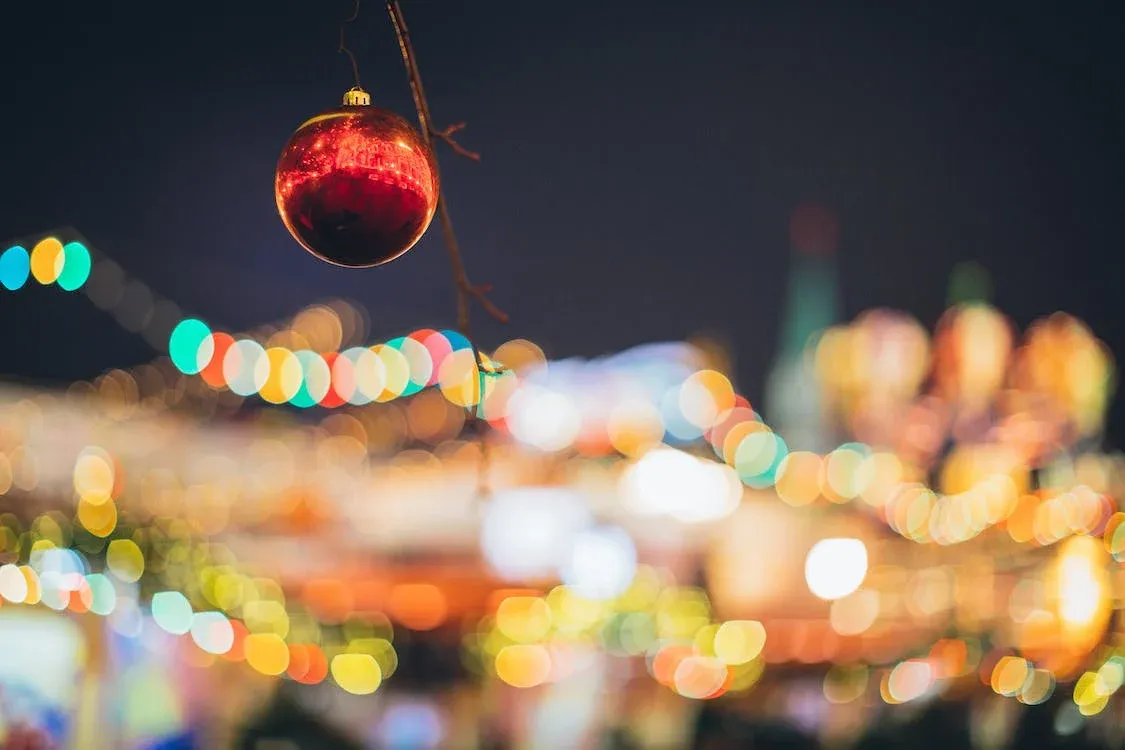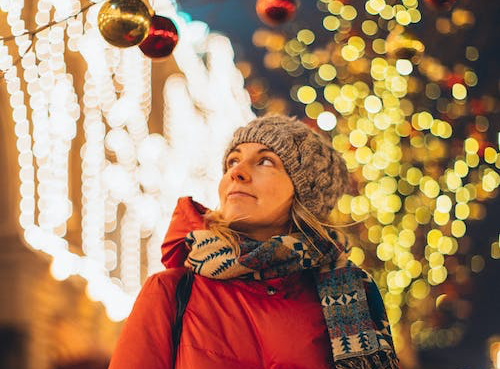What is Loneliness, Really? …and Why Christmas is the Toughest Time for Many
For many, a break at the end of a challenging year doesn’t guarantee those festive feels. We take a look at yuletide loneliness - who’s likely to feel it and why, and the ways you can foster a Christmas connection. #NoSilentNight
good.film
3 years ago

Share

“6:30, dinner with me... I can’t cancel that again.”
—How the Grinch Stole Christmas
It’s December. You’re gearing up for festive end-of-year celebrations; relatives are coming to town; you’re discussing parties and dinners and getaways with mates. All around the nation, tinsel is being strung and Eskies are being hosed in readiness. Ho, ho, ho! Despite all the stress that comes with the organising, travelling and gift-giving… to you, it’s the happiest month of the year.
Orrr - maybe - you’re one of many Australians who will be spending this festive season feeling lonely, in a new era that some are calling the ‘loneliness crisis’.
That’s right: “crisis”. According to a survey by the Australian Red Cross last year, 1 in 3 Aussies felt lonely during the 2021 festive season, with more young people and women reporting feeling more alone than ever before. Sure, we know there was that whole - you know - world-history altering thing that rhymes with shmandemic going on, but studies suggest the trend of people feeling lonelier has increased year on year since 1976. And last we checked, that whole shmovid thing only started a couple of years ago - not back when Rocky was punching his way to the top of the box office.
Why, then, does it feel like we as a species have become increasingly lonely? Particularly when every year we have more and more ways to communicate and stay in touch with our mates, co-workers, family and significant others? Or could that be part of the problem? Those ‘smartphones = bad’ and ‘they’re called cell phones for a reason!’ memes your boomer aunt posts can’t actually be onto something… can they? *shudders*
We looked into the whys, whos and hows of seasonal loneliness, and uncovered some interesting facts to help you understand it better. But we’re hoping this article will come in handy for more than just some roasted chestnuts of knowledge (things like: “how can people still feel lonely when they’re not physically alone?). We’d love to think of it like a virtual Christmas card: one that encourages you to reach out to people you care about, who might be feeling a certain kind of way these holidays.
First up, then, let’s unwrap how feeling lonely actually works - in the science-y sense.
So - What is Loneliness?
First up, loneliness isn’t just about ‘being physically alone’. Sometimes, it’s just the opposite: many who live alone feel highly fulfilled. Think of the self-satisfaction experienced by a solo yachtsman, or the adventuress who lived for a year alone on a windswept Scottish island! Of course, the flip side can also be true: one only has to consider those in toxic relationships to understand how someone who isn’t ‘alone’ can feel very lonely.
Second, here’s a surprising fact: loneliness can be broken down into four widely accepted (and distinctly different) kinds:
- Physical (or “Situational”) loneliness: imagine you’ve moved cities for work, and everything is unfamiliar - you may not even speak the language.
- Emotional loneliness, which comes from a lack of deep relationships with other people like close friends or partners.
- Chronic loneliness, which can be experienced by those in nursing care, people locked in controlling relationships or those who are homeless (which we unpack a little further into this article).
- Social loneliness: that negative, pit-of-the-stomach feeling when our social needs (and we all have them) aren’t being met by the quality of our social relationships.
Since it’s the kind that can prove stickier than a Christmas pudding at this time of year, let’s unpack Social Loneliness a little.
According to the Black Dog Institute, “As social beings, we rely on safe, secure social surroundings to survive and thrive. When we begin to feel lonely, we experience heightened feelings of vulnerability, which can take a toll on both our bodies and our minds.”
To put it another way, social loneliness isn’t just a result of ‘not enough friends’ or ‘being shy’, as people are often led to believe. In many cases, feeling lonely in this way can come as a result of mismatched or unmet expectations for social interactions or connections - and 10 points for when those overrun the calendar like a workshop full of elves? Bingo: Christmas time.
Give us an example, guys!
Sure thing. Say you’re expecting that fizzy gin party at your best mate Gayle’s place to be the cure-all to your holiday slump. You’re primed with anticipation, ready for that BFF fix… only for Gayle to be swept up making those fancy hors d’oeuvres she’s famous for, and swapping bon mots with the 20+ other guests. You barely get to yank a Christmas cracker together, let alone catch up in that tell-me-everything way you were craving.
Expectations dashed, the party winds down. You leave without getting the chance to have that quality time you wanted, and head home feeling disconnected and unvalued. The irony isn’t lost on you that you’re feeling lonelier than you did before - after just going to a party. And you know deep down too that Gayle was just being a great host - you’re still mates, it’s not personal! But that flat feeling’s still there in the base of your gut and the back of your mind. And that feeling, our friends, is social loneliness.
To many of us, this is a familiar idea (not exactly the hors d’oeuvres bit, but you get our gist). We can probably all point to a time in our lives when we can identify what we were feeling as being ‘lonely’. Even if you’ve never felt lonely (wow, where do we sign?), the mental toll that loneliness can take on others - sadness, helplessness or, to a deeper extent, depression - is a concept you can surely empathise with. But the whole ‘take a toll on our bodies’ part is something that might come as a surprise to many.
Yes, you read that right: social isolation or feelings of loneliness physically change our bodies. We’re talking elevated blood pressure, sleep disorders, lowered immune resistance, and increased levels of stress hormones.
Wild, right? It just goes to show that loneliness is a lot more complex than the department store ads make it out to be around this time of year (not to mention those cheesy “classic” Christmas movies - more on those below).
5G Loneliness 24/7
Okay. So that’s loneliness in a nutshell. But that nutshell has now cracked wide open. Thanks to the recent exploits of Silicon Valley (and the truly wild explosion of online interactivity it spawned), our lives and emotions can now be bracingly open and honest: on display for anyone and everyone to see.
Not only is it true that since the shmandemic we’ve seen higher levels of self-reported loneliness, but we’ve all been witness to an entirely new generation of ‘self-reporting’ taking place: in the palm of our hands.
In 2022, we're hearing about emotions and lived mental health experiences more than ever before, thanks to social media… and broadcast media reporting on rampant social media… and then that media feeding back into social media as memes about… the hysterical media. Yep, thanks to those magical glowing rectangles we’re all glued to, and the relatively new interconnectedness they bring, the younger generation of Planet Earth has a huge voice, and those voices - whether joyous and partying, or isolated and lonely - are all set to 11.
This unrestricted forum has pushed new takes into the spotlight in countless ways. From Insta Reels to Reddit, from TikTok to BeReal, we’re seeing an explosion of feels - along with the usual look-at-me vids of Lambo lifestyles and Spring Break bodies (hey, those are enough to make anyone feel left out). So it makes sense that, in a kind of negative feedback loop, we’re seeing millions more minutes of honest app chatter about feelings of loneliness and social isolation.
Couple that with a somewhat surprising set of data: younger people generally report higher levels of loneliness than seniors. According to the Loneliness Experiment - the UK’s biggest ever study on the topic - people aged 16 to 24 are now the loneliest age group, and 34% of 25-34 year olds also reported feeling lonely “often or always”. Compare that to the rather more jolly 65+ age bracket, with only 3% reporting they felt lonely “often or always” - even taking into account the relative tech-savvy of Gen Z’s vs. seniors, this is an unexpected flip.
“Many people tend to associate loneliness with older age, so this pattern might seem surprising. But surveys in New Zealand, Japan and the US have found the same: young adults report feeling lonely more often than older adults.”
Our World in Data
The upshot? We’re experiencing a double-dose of loneliness nowadays. Not only are we finally talking more about our feelings, but we also - particularly young people - now have the tools to communicate those feelings to everyone, any time, and often.
The Yuletide Blues
Okay, we get it - we’re all on our phones. But why do we see such huge spikes in loneliness during the holidays?
It is absolutely true that self-reported rates of loneliness increase in the lead-up to the end-of-year holiday season. Despite all the joy, partying and blisteringly-hot Aussie Christmases going on, that stat we mentioned earlier - that 1 in 3 Aussies feel alone during this time of year - is sadly correct. And this statistic is on par (if not eclipsed by) many other wealthy countries: 40% of people in the U.S. reported feeling lonely during the holiday season last year, with an even higher 48% in the United Kingdom. It can’t just be all that snow, right?
Dr Katherine Coutsoudis at The Soke suggests that it’s partially due to the hype that comes with the season: “We’re bombarded by the ‘magic’ of Christmas from as early as November. We’re constantly reminded what a magical time of year it is, with an emphasis on social engagements and family togetherness. For those who don’t have this in their lives, they may feel their sense of loneliness reinforced”. Julia Samuel MBE, a psychotherapist specialising in grief, agrees with Katherine’s stance, stating that “it’s more pre-existing feelings of loneliness and isolation that are intensified over Christmas”.
This shouldn’t come as a surprise to anyone that’s seen one of the millions of Christmas movies that paint the holiday as some kind of magic band-aid for all of life’s problems, filled with love, connection, a gooey soundtrack and a liberal dose of wacky hijinks. (Seriously, we tried to count the number of made-for-TV Christmas flicks with a fairytale romance / a case of mistaken identity / a talking dog, but got super distracted by the fact that all the posters look literally identical… what is this, the Bauble Cinematic Universe?!)
Aside from the red-silver-and-green reinforcement of media coming at us from every TV screen, billboard, bus shelter poster and supermarket shelf, another consideration is time: specifically, down time. With full-time work generally winding down for most of the population over Christmas, those feelings of loneliness that a person may have been able to quell by keeping their nose to the grindstone during their normal 9-5 might suddenly come bubbling to the surface.
"The holidays are full of scenes of people spending happy times with family and friends, leading some to feel like they are the only ones without loved ones in their lives during this time"
Adam L. Fried, PhD
And of course, that’s to say nothing of loneliness experienced on a wholly different scale: by those who may be homeless over the longer term, or a newly homeless person escaping a domestic or family violence situation. Needless to say, the trauma and emotions experienced in these scenarios can be extreme; the added pressure of a Christmas alone, without support or a safe home, can prove the final straw that tips many to breaking point.
The issues of homelessness and domestic & family violence are more entwined than you might realise. Mission Australia reports that domestic & family violence remains a leading contributor to homelessness in Australia, especially among women and children who are forced to leave their unsafe homes, often with nowhere to go. It’s already a heartbreaking scenario - now for a moment, imagine dealing with it at Christmas time.
“In 2019-20, DFV was the main reason 82,300 people asked for help from specialist homelessness services like Mission Australia”
It’s why we’ve partnered with three of Australia’s leading charities - Mission Australia, Feros Care, and Ending Loneliness Together - to combat the loneliness that stems from issues such as homelessness. We’re fundraising to lend a helping hand and a friendly ear to those who need it most this Christmas, and introduce a touch of joy into some otherwise silent nights. We call it The Togetherness Fund.
Now That I Know More - How Can I Help with Loneliness this Christmas?

We’re glad you asked!
This Christmas season, we’d encourage anyone to donate to our Togetherness Fund: bringing together three of Australia’s best charities, to help anyone experiencing loneliness this holiday season get the support and connection they deserve.
If you’re looking to get more involved, fire up the popcorn and dive into our Binge-Along of so-bad-they’re-good Christmas movies, or share it with a loved one - they’re guaranteed to elicit seasonal LOLs and groans in equal measure!
We’re also delving deeper into the topic of loneliness with our continuing article series. We’ll share some expert tips on how to overcome loneliness if you’re feeling it yourself, or to help those you think might be at-risk this holiday season. They make for a thoughtful read to share with friends or family. So keep an eye on our Instagram, and join our #NoSilentNight mailing list if you haven’t already - we’ll be in touch when our next loneliness articles go live!
If you’re curious about charities tackling other causes you care about, our research doesn’t stop here! Stay connected to good.film for heaps more content aligned with social causes. And since social impact entertainment is your jam, we’d love you to join our community. Match movies and streaming series to causes you care about. Create and share impact lists to keep the conversation going. Help make change where you feel it matters most - and inspire others to do more good!

